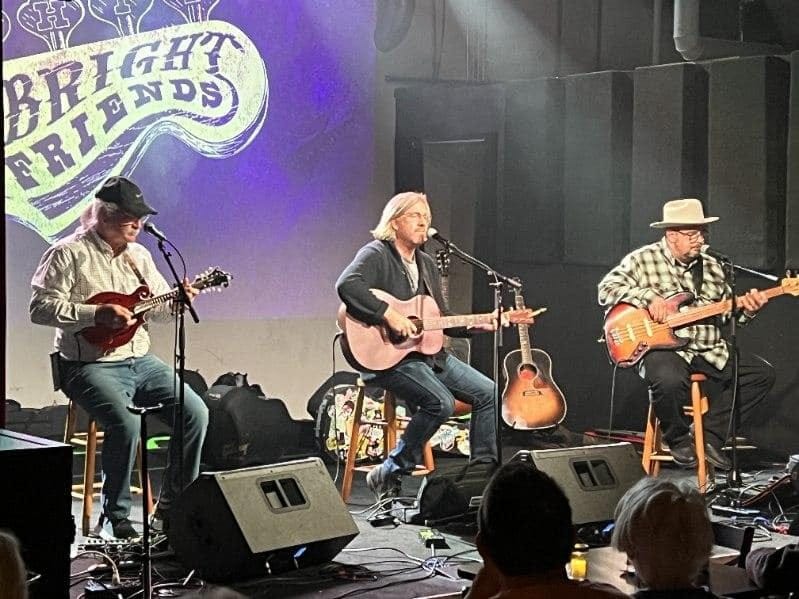The Song in the Story: A Conversation with Chip Albright
25 Years of Songwriting, One Authentic Voice, and the Gigs That Make It All Worth It
There’s something grounding about sitting across from a songwriter like Chip Albright. He’s one of those artists who reminds you that music doesn’t always need to be flashy or high-tech. Sometimes, it just needs to be honest.
Chip and I have become friends in the last year. We bonded over songs, stories, and our mutual love of the deeply personal side of performance. I’ve watched him grow into a gigging rhythm that takes him all across Iowa, from retirement homes and patios to listening rooms like XBK and even a quiet country church near Madrid. But when he sat down with me on Maxwell’s Iowa CoffeeCast, I realized how intentional he’s been about every step of his journey.
“Play the Song, Tell the Story”
Chip’s newest project is a 25-track album drawn from 25 years of songwriting. He’s pairing it with his Substack, Chip Happens, part of the Iowa Writers Collaborative. Each song comes with a story—something to hold onto beyond the chords and melody.
“I take my songs seriously,” Chip told me. “They’re empathetic vignettes. Little short stories. A way to look at life through someone else’s eyes.”
I’ve seen him do that live, capturing a room not with volume but with presence. He told me about a song called “Carry Us Home,” written about resilience in relationships. After performing it at a senior living facility, a woman approached him, visibly moved. “She told me she lost her husband a few years ago and that song just brought it all back in a good way.”
Those are the kinds of moments that keep Chip going. Not big checks. Not record deals. But real human connections.
“I Just Walked Into the Church”
One of my favorite stories from Chip’s recent gigs was about a little church near Madrid. Driving past it one day, he felt compelled to stop.
“I just pulled over, walked in, and said, ‘Hello?’” he laughed. “It was beautiful—stained glass, wooden pews. Total Americana.” He met the caretaker and asked if he could put on a show there. A few months later, he did.
That’s Chip in a nutshell—part artist, part connector. Always following the thread of authenticity.
The Return to Fort Scott
Another highlight in our conversation was about Chip’s return to his hometown of Fort Scott, Kansas, where he played a show at the Liberty Theater, once his childhood movie theater.
“It was my dad’s 75th birthday. The Bourbon County Arts Council was putting on a show, and I asked if I could open. They said, ‘You’re the hometown kid—come on down.’”
He played four songs, including “Chorito Ridge,” a tune about his grandfather, often shared around Veterans Day. And just like that, the circle closed. Songs written over decades, now echoing through a place where he watched films as a child.
Gigging with Grit (and Gratitude)
When I asked Chip how he finds gigs, he gave me a wry smile and said, “Persistence.” That tracks.
With a background in sales, he approaches his music hustle like any good entrepreneur—scouting venues, doing outreach, following up. “Even after a great show, you still have to reach out again for the next one,” he said.
But Chip’s secret sauce isn’t just logistics—it’s empathy. He knows how to read a room. When the crowd’s chatty, he doesn’t scold. He shifts the tone, narrates the moment, says something simple like, “Thank you for listening,” and lets the guilt do the rest.
“People are busy,” he said. “They’ve got their own stuff going on. So when someone actually pauses to listen, I’m grateful.”
“Dreams Never Die”
He’s already working on new material, including a song called “Dreams Never Die.” It’s about how two people can look at the same event and feel totally different. “That duality fascinates me,” Chip said.
It’s that kind of lyrical curiosity that shapes his work. And the songwriting process? It’s opportunistic. A chord progression here, a lyric there. Sometimes, he’ll sit with a guitar just to learn someone else’s song, only to stumble into a new idea of his own.
“Songwriting for me is often about serendipity,” he said. “It’s being open in the moment. Letting something unfold.”
The Business Side of Art
We talked about the economics, too, including his decision to release a physical CD when streaming dominates the industry. But Chip has a point: “A lot of my audience still likes to hold something in their hands. And people kept asking me for CDs.”
So, he bundled 25 songs onto one disc, with cover art designed by his wife, a graphic artist, and sells it for $25. That’s smart merchandising and sincere storytelling rolled into one. Plus, for paid Substack subscribers, they get the CD and accompanying essays about each song.
“I'm trying to give people more than music,” he said. “I want to give them an experience.”
The Power of Hyperlocal
Chip isn’t chasing arenas or stadiums. He’s committed to being a hyperlocal artist. Someone who shows up, listens, and sings his truth for whoever’s in the room. And that matters.
“You don’t have to be famous to make a difference in someone’s life,” he said. “Music can transcend time, unlock memories, and bring people together. That’s enough for me.”
It’s enough for me, too.
Listen to this episode of Maxwell’s Iowa CoffeeCast by clicking HERE.
You can pre-order Chip’s 25-song album and subscribe to his Substack at chipalbrightmusic.com. And if you see his name on a bill near you, go. Sit. Listen. You’ll leave a little more connected than when you arrived.





Thanks Maxwell! I always enjoy our conversations and your unwavering support for the singer-songwriter journey. All my best my friend, so glad I’ve met you on this road.